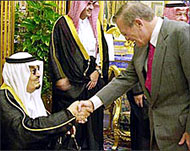Profile: King Fahd
King Fahd, believed to have been born in 1921, took charge of Saudi Arabia in 1982, a vast kingdom that occupies most of Arabia, the cradle of Islam and the world’s biggest oil exporter.

The king, afflicted by ill health since a stroke in 1995, delegated the day-to-day business of government to his half-brother, Crown Prince Abdullah bin Abdul Aziz, who held the reins in the days after the attacks on the United States on 11 September 2001, and when al-Qaida strikes hit at home.
As absolute ruler, Fahd was confronted from his first year on the throne with a 20% slump in oil prices, the lifeline of the Arab Gulf state’s economy.
Tumultuous times
As prices slid over the next four years, he embarked on economic reforms by slashing huge state subsidies. But Fahd also presided over a spectacular military buildup.
 |
|
Fahd was custodian of Islam’s |
It was still not enough to stand up to the Iraqi forces that invaded neighbouring Kuwait in 1990, when King Fahd accepted the deployment of hundreds of thousands of US-led troops in Saudi Arabia, home to Islam’s holiest shrines.
Military spending shot up again after the war, while payments for driving Iraqi forces out of Kuwait and low oil prices turned what was once a creditor nation into one weighed down by debts, until a dramatic recovery in prices from 1999.
Hoping to pre-empt potential unrest spurred by Muslim hardliners and the economic slide, King Fahd initiated political reforms in 1992.
Saudi reforms
He passed a basic statute of government which serves as a constitution based on the Quran and Sharia, or Islamic law. The following year, he appointed a 60-seat Shura (consultative) Council, which was gradually expanded to reach 150 members in April 2005.
But the military alliance with Washington had triggered deep anger among Saudi Islamic hardliners, who see the nation of Islam as not needing such an alliance.
 |
|
The leader of Saudi Arabia had an |
In November 1995 and June 1996, a total of 24 US soldiers were killed in bomb attacks in Riyadh and the eastern city of al-Khubar. Four Saudis were executed for the first attack.
Washington has linked bin Laden to the al-Khubar blast.
Suspected al-Qaida fighters have since carried out a spate of deadly attacks, many targeting Westerners, which began in May 2003, including the beheading of a US engineer kidnapped in Riyadh and a hostage-taking rampage in al-Khubar in May 2004 that left 22 people dead.
According to official figures, 90 civilians, 41 security personnel and 110 insurgents have died in the violence.
The government’s crackdown on al-Qaida helped ease strains with Washington caused by the September 11 attacks in which 15 of 19 hijackers were Saudi.
But Saudi Arabia, which had hosted US troops during the Kuwait war, publicy distanced itself from the US-led invasion of Iraq that toppled Saddam Hussein in 2003, but quietly provided assistance from its Prince Sultan airbase.
Long reign
Fahd acceded to the throne in June 1982 and began to present himself as leader of the Islamic world.
As crown prince, he had already proposed a Middle East peace plan featuring recognition of Israel. By 1986 he took the title of “custodian” of Islam’s holiest sites in Makka and Madina.
And in 1989 he brought Lebanese MPs to the western Saudi mountain resort of al-Taif to hammer out an accord which ended 15 years of civil war.
 |
|
Muslim hardliners resented King |
As the eighth son of Abdul Aziz al-Saud who founded Saudi Arabia in 1932, Fahd rose rapidly up the ranks, becoming education minister in 1953 before taking over as interior minister.
Designated as next in line after King Faisal’s assassination in 1975, Fahd was in practical terms running the country under the rule of his ailing brother King Khaled from 1975 to 1982.
The turning point in his own life came when he suffered a stroke on 29 November 1995, although Fahd whose name means “leopard” in Arabic, returned to his post to chair the weekly cabinet meeting from February 1996.
Walking first with the help of a cane because of circulatory problems and diabetes, the ailing king took to wearing sunglasses to protect his eyes. He underwent several further operations and was soon confined to a wheelchair.
The king – once a tall, affable and portly figure – has been rated one of the world’s richest men by the US business magazine Forbes.